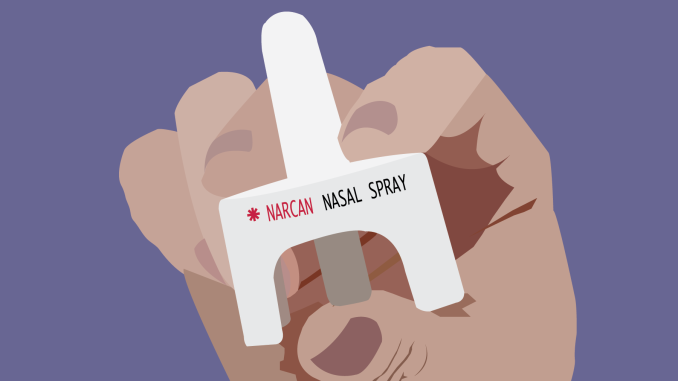
September is National Recovery Month, a time to support the nation’s substance use recovery community and acknowledge the dedication of service providers who make recovery possible.
Drug overdose deaths are at a historic high in Philadelphia, with opioid overdoses alone taking more than 1,200 lives in the city in 2021, a 5 percent increase from 2020, according to the Philadelphia Department of Health. Opioids are a class of drugs that include heroin, synthetic opioids like fentanyl, and pain relievers available legally by prescription, like oxycodone and morphine, according to the National Institute on Drug Abuse.
Harm reduction supplies, like Naloxone, commonly known as Narcan, an opioid overdose reversal, have become prominent life saving measures to combat rising opioid overdoses.
Drug use and overdoses will continue to happen, but Temple students can arm themselves with the knowledge and tools necessary to prevent overdose deaths. Narcan should be carried by every student to protect themselves, their friends and their community.
Narcan blocks the receptors in the brain that opioids act on, which can effectively reverse an overdose and save somebody’s life, said Jerry Stahler, a geography and urban studies professor and a member of the Board of Directors of Prevention Point, a public health organization that provides harm reduction services to the Philadelphia community.
“Having widespread access to Narcan is a really good idea, even if it’s not your friends, even if you just happen to be a bystander, you could be saving somebody’s life,” Stahler said.
When a person is suffering from an opioid overdose, their breathing can dangerously slow down or stop completely, according to the Centers for Disease Control and Prevention. Signs of an overdose may include slow and shallow breathing, falling asleep or unconscious and cold or pale skin.
If someone sees a person they believe to be overdosing, they should call 911 and, if possible, administer Narcan while they wait to increase the likelihood of survival. If the person is not overdosing on an opioid and is given Narcan, they won’t be harmed, according to the Food and Drug Administration.
Although Temple doesn’t currently provide Narcan for students, Pennsylvania’s government, the City of Philadelphia and numerous recovery organizations near Main Campus provide free Narcan and accompanying training, providing the knowledge necessary to save lives and help combat the opioid epidemic.
Here are some resources offered:
Pennsylvanians, including students, can print out this standing order and bring it to their local pharmacy to obtain Narcan, according to Pennsylvania’s Department of Drug and Alcohol Programs. With insurance, Narcan at the pharmacy can cost between $20-$40, and without insurance, it costs about $50, The Philadelphia Inquirer reported. However, Pennsylvania has a Co-Pay Assistance Program in which residents who purchase Narcan may be eligible to receive up to $75 in reimbursement.
- Pennsylvania residents are also eligible to receive free Narcan in the mail through the NextDistro website, an online and mail-based harm reduction service. In order to qualify, recipients must watch a training video, complete a short quiz and fill out enrollment information.
- The Philadelphia Department of Public Health also opened a Naloxone Near Me tower in 2022 at the Lucien E. Blackwell West Philadelphia Regional Library at 52nd and Sansom Streets. This allows people to get free Narcan and other overdose reversal supplies 24 hours a day, seven days a week, anonymously, according to the City of Philadelphia.
- The Everywhere Project and Savage Sisters, two nonprofit organizations based in Philadelphia, also provide harm reduction resources and educational tools to community members living with or affected by substance use disorder.
- The Philadelphia Department of Public Health offers free online Naloxone administration training twice a month. These training sessions provide background information, data on opioid use and a detailed description of how to recognize and respond to an opioid-related overdose with Narcan.
Lu Collina, a junior public health major, carries Narcan on a daily basis. The Narcan they were carrying was once used to reverse an overdose in Philadelphia.
“Substance use doesn’t have a race, it doesn’t have a gender, it doesn’t have a socioeconomic status,” Collina said. “All of these things can happen to anyone at any time. The chances that you are going to be put in this situation are low but never zero, and you would absolutely rather have this life saving medication on you.”
Narcan access is associated with a 14 percent reduction in opioid overdose deaths, according to a November 2018 study from the Addiction Behaviors journal. While Narcan doesn’t entirely solve the opioid overdose crisis, it’s a harm reduction method proven effective at saving lives and every person should be aware of its capabilities.
Sofia Cordero, a senior statistical science and data analytics major, carries Narcan she was given at a music festival in 2021. She continued carrying it while on campus in case she ever witnessed someone who needed it.
“For Narcan, just in general, you could see someone on the street having an overdose and you could save their life,” Cordero said.
Temple students are fortunate to live in a large and diverse urban environment. However, they should be mindful that in a city gripped by the opioid epidemic, interacting with someone suffering from an overdose is a real possibility. Narcan is a simple and accessible way to save lives in the city, and all students should explore their options to carry these resources with them.


Be the first to comment